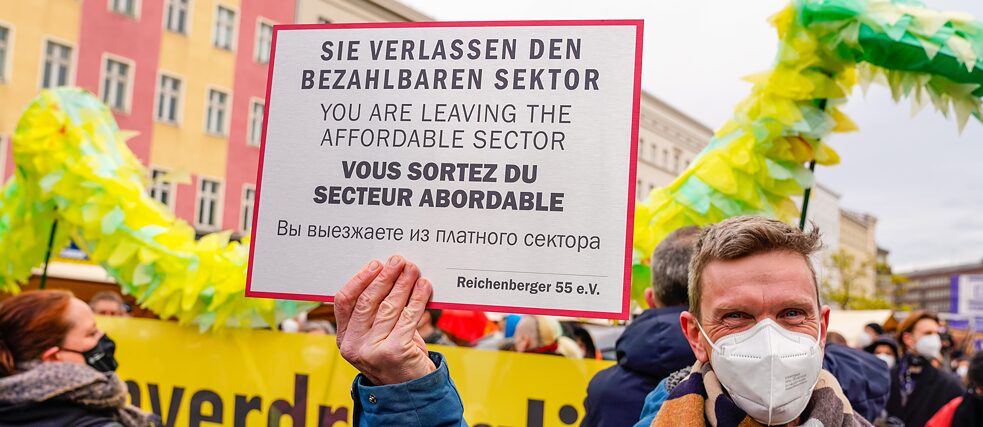Frankly ... Berlin
Nostalgia or a happier future? You can’t get more Berlin than that!

The word sounds like a bygone utopia, but perhaps expropriation is the city’s ultimate future. This week, our Berlin columnist Margarita Tsomou takes you with her on a demo that is the knee-jerk reaction of the city’s diverse society to the overturning of the rent cap.
By Margarita Tsomou
My cousin, a flamboyant pop musician in her mid-twenties from Athens, wants to move to Berlin, as does any cosmopolitan creative artist who takes herself seriously. Though she speaks German and has the energy to survive the jungle that is the Berlin cultural scene, I am hesitant to encourage her. The problem is how to find an affordable flat.
Though housing has always been a social issue historically, it has assumed absurd proportions in Berlin in recent years. Rents have risen threefold on average, whereas incomes have not. Political and cultural housing projects that have harboured the spirit of collectivity are being systematically evacuated. Berlin is running the risk of becoming as shockingly expensive as other big cities like Paris or New York – a kind of facade of faceless consumerism, a cultural wasteland from which diverse, subcultural, queer-feminist and migrant cultural production is banished because the only people who can afford to live in the city centres are pseudo-creative advertising professionals with pots of money.
The rent cap served as a kind of emergency brake in this process – the Berlin Senate had frozen rents for a period of five years, while many rents even had to be lowered. This truly avant-garde step by the Berlin government was a response to the pressure from the city’s urban and tenant movements that have been forming for years. It caused a huge stir: investor lobbyists protested about their financial losses, while Berliners no longer had to fear losing their homes.
Rents Should Be a Federal Matter
Now, however, the (political parties) CDU and FDP, claiming that the question of rents should be a federal matter, filed a complaint with the Constitutional Court, which ruled in their favour. Berlin’s rent cap has been overturned. As a consequence, many tenants in Berlin suddenly have to pay back the difference in rent in the midst of the coronavirus pandemic – including arrears accumulated since June 2019. This also sends out a political signal: the right to a place to live has been delegitimized. Housing is treated as merely the business model of hedge funds and institutional investors, who own the lion’s share of flats in Berlin. The result will be that low-income residents will be increasingly crowded out; precisely those who make Berlin the crazy, diverse and cultural oasis that we love.Housing is a Human Right
This Berlin isn’t giving up yet, however: when the verdict was announced, over 15,000 colourful demonstrators gathered spontaneously on the streets of the city’s Neukölln and Kreuzberg districts. They popped up out of nowhere like a knee-jerk reaction of urban society, a response of the critical social mass in Berlin that is demanding its right to the city: those living on the breadline and the tree-huggers, migrants, older citizens and young families, the professional classes and the club scene, school kids and blue-collar workers. This cross-section of Berlin civil society highlighted the fact that housing is a human right and must not be allowed to hinge on the profit aspirations of the private market. They held up posters emblazoned with the slogan “Now it’s high time for expropriation”. For the tenant movement, the consequence of the failed rent cap now is that their campaign to expropriate big property owners such as Deutsche Wohnen must succeed.Expropriation and public ownership may sound like a nostalgically utopian demand from another century, but for Berlin it is a question of pure pragmatism. The latest ingenious idea of the tenant movement is as follows: pursuant to Article 15 of Germany’s Basic Law, land can be transferred into public ownership for the purposes of socialization. This is the legal basis upon which the activists are demanding that a good 240,000 flats, which had been sold “for peanuts” to private property corporations (such as Deutsche Wohnen), should be bought back at low cost by the city and then placed under democratic control again. Thousands of activists with their yellow and purple campaign stalls are currently to be seen dotted around the Berlin cityscape. They are collecting signatures to force the expropriation via a referendum – in other words, the public ownership of housing could become a reality in Berlin. They meanwhile have the support of unions, migrant associations, youth organizations, and indeed Fridays for Future, who argue that it will be easier to make buildings more energy-efficient if they belong to society as a whole.
This diversity of city initiatives shows not least how wrong the distinction is that is made in Germany between so-called identity and class (i.e. social) issues: as far as housing is concerned, it is clear that queer feminists and industrial workers can easily pull together to achieve a political goal. For example, one banner displayed at the demo read in English: “Queers und sex workers against gentrification: sex work is work, being a landlord isn’t.“ And you can’t get more Berlin than that.
“FRANKLY …”
On an alternating basis each week, our “Frankly ...” column series is written by Margarita Tsomou, Maximilian Buddenbohm and Dominic Otiang’a. In “Frankly ... Berlin”, our columnists throw themselves into the hustle and bustle of the big city on our behalf, reports on life in Berlin and gathers together some everyday observations: on the underground, in the supermarket Frankly … Berlin, in a nightclub.